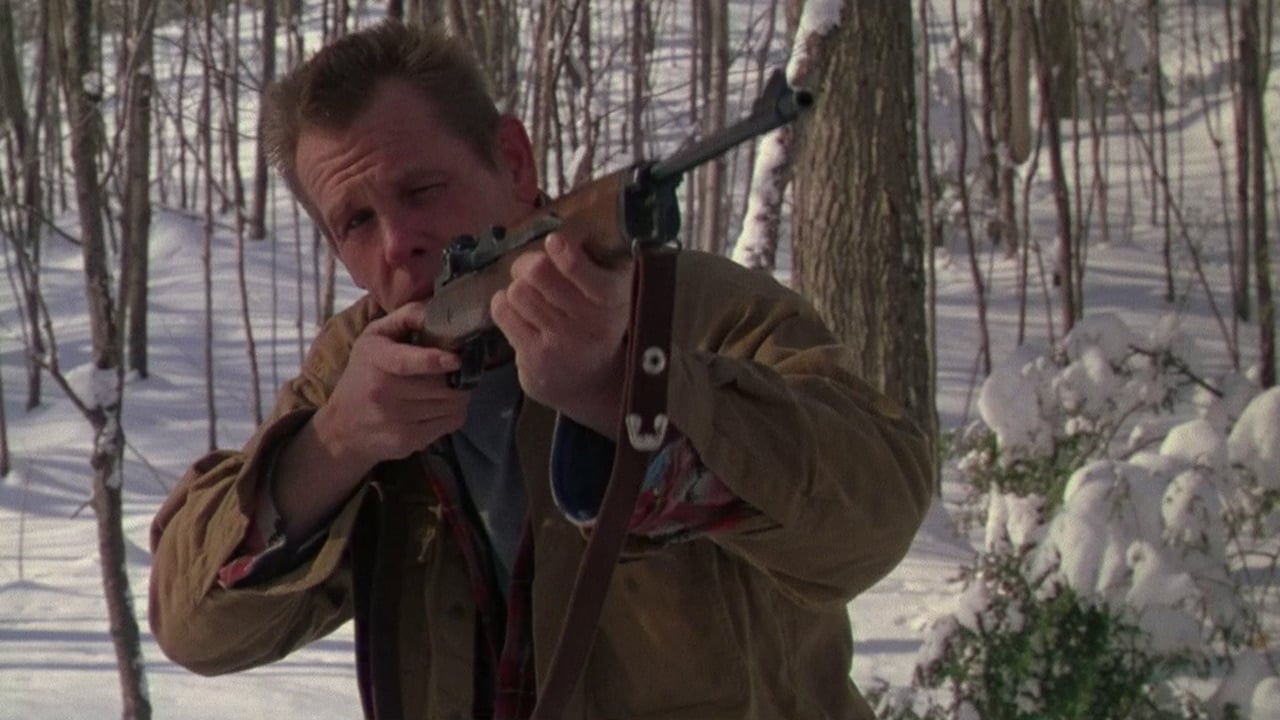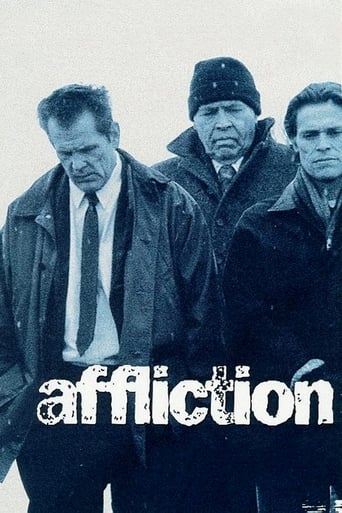

The affliction referred to in the title of this film is clearly intended to be interpreted as violence. Wade's brother makes this clear when he tells him that he has not been affected by Wade's "affliction." And yes, we see extreme verbal abuse along with "mild" physical violence in their father, Ben. And yes, we see a pent-up violence in Wade. Without condoning or encouraging murder, consider an alternate interpretation...As an alternative, is Wade's passivity and his refusal to fight back against his abusive father truly admirable or healthy? Is passivity the sane condition from which Wade falls into madness? Or is his continued acceptance of abuse a mental illness? Consider the scenes when Ben abuses young Wade and his mother; don't we want to stop Ben? Don't we want Wade to stand up to his father? And later, when Wade is a grown man, don't we want him to protect himself and Margie and his mother from Ben's continued abuse? Instead he takes it; he still acts like a child who is under the control of a parent.An alternative interpretation would be that Wade's character flaw is not that he is drawn to violence but that he can't stand up against violence. His unhealthy desire for his father's love keeps him trapped in an abusive relationship. Perhaps it is not an affliction to want to fight back against Ben's sickness. Ben is cruel and enjoys being cruel. That is an illness that deserves to be stopped, preferably without violence, but still it deserves to be stopped.If Wade hadn't stuffed his anger so far down his entire life, if he hadn't let himself be a victim for so long, perhaps he could have found a non-violent response to his father's abuse. Perhaps he could have followed the more healthy path his brother did - he could have left his father and lived his own life.As a comparison, consider abuse in a marital relationship.We would call the Wade-type partner an enabler of the abusive Ben-type partner. We would counsel the enabler/victim Wde to develop a sense of self-worth and self-actualization in order to leave the abusive relationship. Right? We would not encourage the enabler to continue to accept the abuse endlessly. Perhaps it is Wade's inability to stand up to his father in a healthy way that is his true affliction.After a lifetime of struggle, it would seem that the only way for the abusive relationship to end is for one of them to die. The two are locked in a metaphorical fight-to-the-death as Ben abuses Wade and Wade stays around to take it. If Wade continued in the path of an enabler, if he continued on the same path without character growth, he would kill himself to allow his father to win. Instead Wade finally finds the strength within himself to react to the abuse. Isn't that a logical, i.e. sane, response? Again, without condoning murder, don't we think the old bastard deserved it? Isn't it possible that by finally reacting to Ben's abuse, Wade has discovered his true self rather than losing it? For example, consider two interpretations of the murder scene. As Wade aims the rifle at his fallen father, we see a flicker of emotion in his face when he suspects his father is already dead. Then, when he discovers that his father is in fact dead, his expression relaxes into something else. One interpretation would be that the first expression is disappointment that he has already killed his father and doesn't get to shoot him in a more intentionally violent way. Then. the reaction after realizing his father is dead could be the joy of having embraced his innate violence.But Wade's initial blow to Ben's head is more reflexive than premeditated. And he doesn't actually shoot the gun even though he is still in a rage. He looks through the site but he doesn't shoot. He hesitates. Shooting the gun would be an act of intentional violence and symbolic of a descent into violence. But he doesn't do it. Perhaps the first reaction is not one of disappointment but of concern for what he has done. Although he hates his father, he could be appalled and frightened to find that he has killed him. It is possible that the second expression is one of peace. Not the peace of being violent but the peace of being free of his tormentor. Peace at being free to move on from the childish state his father has kept him in into a state of self-actualization and growth; of adulthood.Consider also the sub-plot of Twombly. The murder of Jack is also represented as a descent of the rationality of Wade and his descent into madness. And yet the writers have set up the story so neatly and the evidence so clearly that it seems that Wade's "hallucinations" about Twombly's death are rational. The characters look and speak as if they are guilty, too. Again, without condoning murder, isn't it possible to interpret Wade's murder of Jack as a rational action in the face of the evidence? Of course murder is inexcusable in real life but as an artistic device isn't it possible that Wade's self-actualization allows him to finally stand up to the namby-pamby Gordon figure? To stand up to the actual and real conspiracy? In the final voice-over, we learn that Twombly's son-in-law does, in fact, destroy the town for his own financial gain. Isn't it possible that this supports Wade's conspiracy theory? Again, while not condoning violence, instead of thinking that Wade slinks off in disgrace after his violent behavior, it is possible to envision a stronger, healthier, and self-actualized Wade who leaves town with a sense of his own worth; that despite his guilt over his violent actions that he becomes more in tune with his true emotions and is able to enter into healthy relationships.Just food for thought...
... View MoreWade Whitehouse (Nick Nolte) is a small town sheriff in New Hampshire. He's out with his daughter Jill on Halloween. He has a troubled relationship with her and his ex-wife Lillian. He is known as a drinker. Local Jack Hewitt guides a wealthy outsider to hunt for a prize buck. Jack claims that he accidentally shot himself but Wade is suspicious of the death especially since he's suppose to testify in an organized crime case. Wade and his girlfriend Margie Fogg (Sissy Spacek) visit his abusive father Glen (James Coburn) and find his mother dead in the freezing house. Wade's brother Rolfe (Willem Dafoe) and sister Lena return for the funeral. I don't always like narration and this opening narration really puts me off. It emphasizes to me the novelized nature of the movie which highlights the story's unfocused meandering nature. Nick Nolte is terrific and the cast is full of top notch players. It's nice to see James Coburn still acting with power. I need the movie to be more focus. There's a murder mystery and quickly, it's taken over by a dysfunctional family drama. It seems to be a constant pitfall for all adaptations from novels. The transfer from the page to the screen is not always smooth.
... View MoreAFFLICTION is really a marvelous movie, and Nick Nolte show a very dark side of himself, darker then he have shown in real life the last years, Oh yes - I remember him in HULK! But here he is something human, a person who cross the line. The plot dwell about the the past with his brother Rolfe - his violent and alcoholic father and their dead mother, and now grown up - Wade Whitehouse is nothing, meanwhile brother is teacher in a college. And right between stand Maggie Fogg, Wades girlfriend - and his friend Jack - an probable accident push them all away. They all stand in Wades way into the fire, and the whole thing triggers with Wades father Glen. James Coburn absolutely deserve his Oscar - but I think Nick Nolte should have one too - this is a great movie! Leonard
... View MoreAn assuredly downbeat, intentionally unpleasant story, adapted by director Paul Schrader from Russell Banks' book, about a divorced, desperate middle-aged man in a snowy small town who is unable to come to terms with his volatile past. James Coburn and Nick Nolte are gripping as father and son, with Coburn winning a Supporting Oscar for his superbly gritty and totally unsympathetic turn; yet, even as the film strikes truthful notes, it lays possibly too much grim material on us. The father is not only abusive and an alcoholic, but something of a psychotic (Schrader treats the three as if they are naturally linked). A sub-plot about a shooting never quite connects with the central situation, and Sissy Spacek isn't given much to do as a long-time acquaintance. Strictly viewed as a showcase for the two actors, worthwhile; but as a movie-going experience, the frozen waste of the land and the uncommunicative relationships left me chilled and unsatisfied. ** from ****
... View More